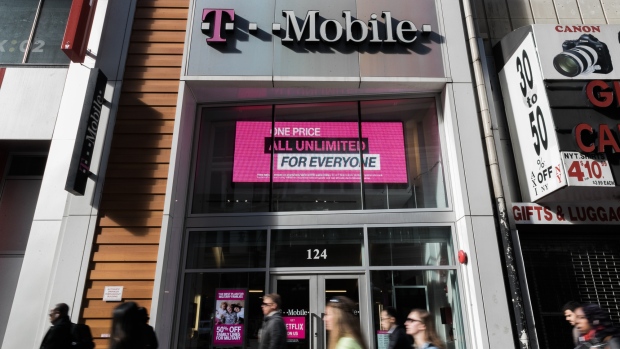Oct 9, 2019
T-Mobile Mississippi Deal Dents Coalition Challenging Merger
, Bloomberg News

(Bloomberg) -- T-Mobile US Inc. reached an agreement with Mississippi officials over the wireless company’s proposed merger with rival Sprint Corp., putting a dent in the coalition of U.S. states that sued to fight the combination on antitrust grounds.
Mississippi Attorney General Jim Hood said on Wednesday the merged company will deploy 5G technology to 62% of the state’s population, including rural areas, within three years. Only 2% of the population would benefit from such technology under a standalone T-Mobile, he said in a statement.
“The world around us is almost fully digital, but Mississippi is lagging behind with internet deserts across the state” said Hood, a Democrat. “My agreement with T-Mobile will help fill this gap, and I appreciate their commitments made specifically to Mississippi counties that lacked service.”
Until now, the legal fight to block the merger had been expanding since the lawsuit was filed in June by more than a dozen states and the District of Columbia. Illinois, Texas and Oregon are among those that joined after the case was filed, citing concern for higher consumer prices and reduced competition.
Read More: T-Mobile’s Sprint Deal Still Faces Trial With Dubious States
The move by Mississippi suggests T-Mobile may be working behind the scenes to chip away at the coalition by making state-specific guarantees on wireless technology before a high-stakes trial set to start in December in Manhattan.
Neither company immediately returned calls seeking comment on the settlement.
T-Mobile and Sprint won approval from the U.S. Justice Department’s antitrust division after agreeing to sell assets to Dish Network Corp. The companies have disputed claims from states including New York and California that the combination will stifle competition and raise prices.
The coalition of states fighting the merger has said in court filings that the Dish deal, intended to create a new rival in the market and preserve competition, was a “fig leaf” that wouldn’t really help consumers.
“With every passing day, we continue to build a strong case that this mega-merger is bad for innovation, bad for workers, and bad for consumers,” New York Attorney General Letitia James said in a statement. “And we look forward to presenting these arguments in court.”
(Updates with comment from New York attorney general.)
To contact the reporters on this story: Erik Larson in New York at elarson4@bloomberg.net;Scott Moritz in New York at smoritz6@bloomberg.net
To contact the editors responsible for this story: David Glovin at dglovin@bloomberg.net, Steve Stroth
©2019 Bloomberg L.P.